数据结构与算法-二叉树
二叉树
每个结点最多只有两个子结点的树称为二叉树,二叉树的子结点分为左结点和右结点
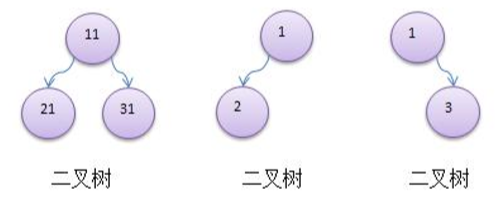
二叉树的所有叶子结点都在最后一层,且结点 = 2 ^ n - 1,则称之为满二叉树(n)为层数
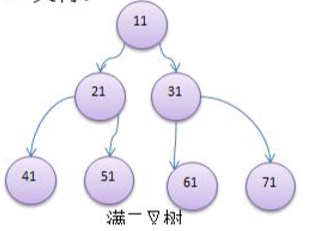
二叉树的所有叶子结点都在最后一层或者倒数第二层,且最后一层的叶子结点左连续,倒数第二层叶子结点右连续,则称之为完全二叉树
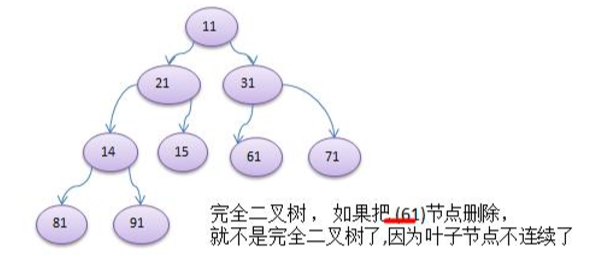
1. 二叉树的遍历
1.1 思路分析
- 前序遍历:父结点--左子树--右子树
- 先输出当前结点(初始为根结点)
- 若左子结点不为空,则递归进行前序遍历
- 若右子结点不为空,则递归继续前序遍历
- 中序遍历:左子树--父结点--右子树
- 若当前结点的左子结点不为空,则递归中序遍历
- 输出当前结点
- 若当前结点的右子结点不为空,则递归中序遍历
- 后序遍历:左子树--右子树--父结点
- 若当前结点的左子结点不为空,则递归后序遍历
- 若当前结点的右子结点不为空,则递归后序遍历
- 输出当前结点
看输出父结点的顺序,确定 前中后
!!可以先将 父结点排好,再按顺序填入孩子
1.2 代码实现
package cn.imut;
public class BinaryTreeDemo {
public static void main(String[] args) {
//创建二叉树
BinaryTree binaryTree = new BinaryTree();
//创建结点
HeroNode node = new HeroNode(1, "张磊");
HeroNode node1 = new HeroNode(2, "王雁明");
HeroNode node2 = new HeroNode(3, "纪烁");
HeroNode node3 = new HeroNode(4, "袁国伟");
HeroNode node4 = new HeroNode(5, "王彬");
HeroNode node5 = new HeroNode(6, "苏志辉");
//先手动创建二叉树
node.setLeft(node1); //1的左孩子是2
node.setRight(node2); //1的右孩子是3
node1.setLeft(node3);
node1.setRight(node4);
node2.setLeft(node5);
binaryTree.setRoot(node); //根结点
//测试
System.out.println("前序");
binaryTree.preOrder();
System.out.println("中序");
binaryTree.infixOrder();
System.out.println("后序");
binaryTree.postOrder();
}
}
//定义结点
class HeroNode {
private int no;
private String name;
private HeroNode left; //左孩子 默认null
private HeroNode right; //右孩子 默认null
public HeroNode(int no, String name) {
this.no = no;
this.name = name;
}
//前序遍历
public void preOrder() {
System.out.println(this); //先输出父结点
//递归向左子树前序遍历
if(this.left != null) {
this.left.preOrder();
}
//递归向右子树前序遍历
if(this.right != null) {
this.right.preOrder();
}
}
//中序遍历
public void infixOrder() {
//递归向左子树中序遍历
if(this.left != null) {
this.left.infixOrder();
}
//输出结点
System.out.println(this);
//递归向右子树中序遍历
if(this.right != null) {
this.right.infixOrder();
}
}
//后序结点
public void postOrder() {
if (this.left != null) {
this.left.postOrder();
}
if (this.right != null) {
this.right.postOrder();
}
System.out.println(this);
}
@Override
public String toString() {
return "HeroNode{" +
"no=" + no +
", name='" + name + '\'' +
'}';
}
public int getNo() {
return no;
}
public void setNo(int no) {
this.no = no;
}
public String getName() {
return name;
}
public void setName(String name) {
this.name = name;
}
public HeroNode getLeft() {
return left;
}
public void setLeft(HeroNode left) {
this.left = left;
}
public HeroNode getRight() {
return right;
}
public void setRight(HeroNode right) {
this.right = right;
}
}
//定义二叉树
class BinaryTree {
private HeroNode root; //定义根结点
public void setRoot(HeroNode root) {
this.root = root;
}
//前序遍历
public void preOrder() {
if (this.root != null) {
this.root.preOrder();
}else {
System.out.println("二叉树为空");
}
}
//中序遍历
public void infixOrder() {
if(this.root != null) {
this.root.infixOrder();
}else {
System.out.println("二叉树为空");
}
}
//后序遍历
public void postOrder() {
if(this.root != null) {
this.root.postOrder();
}else {
System.out.println("二叉树为空");
}
}
}
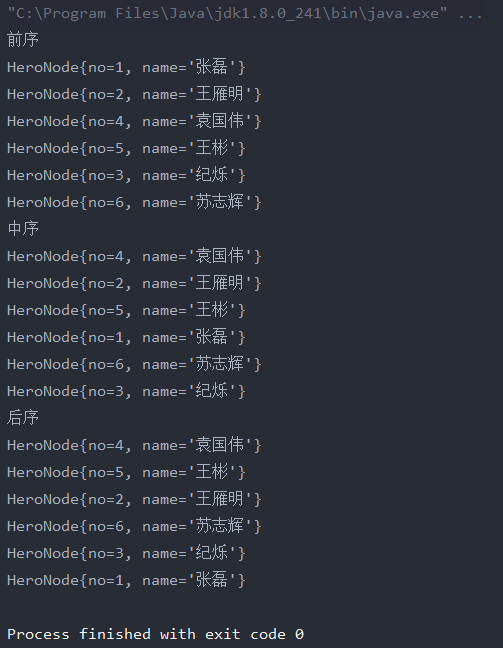
2. 查找指定结点
2.1 思路分析
- 前序查找
- 先判断当前结点的no是否等于要查找的
- 如果是相等,则返回当前结点
- 如果不相等,则判断当前结点的左子树是否为空,若不为空,则前序查找
- 若左递归查找,找到结点,则返回,否则继续判断当前结点的右结点是否为空,不为空便右递归查找
- 中序查找
- 判断当前结点的右子结点是否为空,若不为空,则递归中序查找
- 找到便返回i,否则和当前结点比较,是则返回,不是继续右递归
- 若右递归还没找到,返回null,找到则返回结点
- 后序查找
- 判断当前结点左子结点是否为空,若不为空,则递归后序查找
- 若找到,则返回。否则判断当前结点的右子结点是否为空,不为空则右递归后序查找,找到则返回
- 没找到返回null
2.2 代码实现
package cn.imut;
public class BinaryTreeDemo {
public static void main(String[] args) {
//创建二叉树
BinaryTree binaryTree = new BinaryTree();
//创建结点
HeroNode root = new HeroNode(1,"zl");
HeroNode node1 = new HeroNode(2,"js");
HeroNode node2 = new HeroNode(3,"wym");
HeroNode node3 = new HeroNode(4,"wb");
HeroNode node4 = new HeroNode(5,"szh");
//创建二叉树
root.setLeft(node1);
root.setRight(node2);
node2.setRight(node3);
node2.setLeft(node4);
binaryTree.setRoot(root);
//测试
System.out.println("前序遍历"); //1 2 3 5 4
binaryTree.preOrder();
System.out.println("中序遍历"); //2 1 5 3 4
binaryTree.infixOrder();
System.out.println("后序遍历"); //2 5 4 3 1
binaryTree.postOrder();
//前序遍历查找
HeroNode resNode = binaryTree.preOrderSearch(5);
if(resNode != null) {
System.out.printf("找到了,信息为%d name=%s", resNode.getNo(), resNode.getName());
}else {
System.out.printf("没有找到 no = %d 的英雄", 5);
}
//中序遍历查找
HeroNode resNode1 = binaryTree.infixOrderSearch(4);
if(resNode != null) {
System.out.printf("找到了,信息为%d name=%s", resNode1.getNo(), resNode1.getName());
}else {
System.out.printf("没有找到 no = %d 的英雄", 4);
}
//后序遍历查找
HeroNode resNode2 = binaryTree.preOrderSearch(3);
if(resNode != null) {
System.out.printf("找到了,信息为%d name=%s", resNode2.getNo(), resNode2.getName());
}else {
System.out.printf("没有找到 no = %d 的英雄", 3);
}
}
}
//二叉树
class BinaryTree {
private HeroNode root;
public void setRoot(HeroNode root) {
this.root = root;
}
//前序遍历
public void preOrder() {
if (this.root != null) {
this.root.preOrder();
}else {
System.out.println("二叉树为空,无法遍历");
}
}
//中序遍历
public void infixOrder() {
if (this.root != null) {
this.root.infixOrder();
}else {
System.out.println("二叉树为空,无法遍历");
}
}
//后序遍历
public void postOrder() {
if (this.root != null) {
this.root.postOrder();
}else {
System.out.println("二叉树为空,无法遍历");
}
}
//前序遍历()
public HeroNode preOrderSearch(int no) {
if(root != null) {
return root.preOrderSearch(no);
}else {
return null;
}
}
//中序遍历()
public HeroNode infixOrderSearch(int no) {
if(root != null) {
return root.infixOrderSearch(no);
}else {
return null;
}
}
//后序遍历()
public HeroNode postOrderSearch(int no) {
if(root != null) {
return root.postOrderSearch(no);
}else {
return null;
}
}
}
//结点
class HeroNode {
private int no;
private String name;
private HeroNode left; //默认 null
private HeroNode right; //默认 null
public HeroNode(int no, String name) {
this.no = no;
this.name = name;
}
@Override
public String toString() {
return "HeroNode{" +
"no=" + no +
", name='" + name + '\'' +
'}';
}
public int getNo() {
return no;
}
public void setNo(int no) {
this.no = no;
}
public String getName() {
return name;
}
public void setName(String name) {
this.name = name;
}
public HeroNode getLeft() {
return left;
}
public void setLeft(HeroNode left) {
this.left = left;
}
public HeroNode getRight() {
return right;
}
public void setRight(HeroNode right) {
this.right = right;
}
//前序遍历
public void preOrder() {
//输出父结点
System.out.println(this);
//递归左子树前序遍历
if (this.left != null) {
this.left.preOrder();
}
//递归右子树前序遍历
if(this.right != null) {
this.right.preOrder();
}
}
//中序遍历
public void infixOrder() {
//递归左子树中序遍历
if (this.left != null) {
this.left.infixOrder();
}
//输出父结点
System.out.println(this);
//递归右子树中序遍历
if(this.right != null) {
this.right.infixOrder();
}
}
//后序遍历
public void postOrder() {
//递归左子树后序遍历
if (this.left != null) {
this.left.postOrder();
}
//递归右子树后序遍历
if(this.right != null) {
this.right.postOrder();
}
//输出父结点
System.out.println(this);
}
/**
* 前序遍历查找
* @param no 查找no
* @return 找到则返回 Node,否则返回 null
*/
public HeroNode preOrderSearch(int no) {
System.out.println("进入前序查找");
//比较当前结点
if(this.no == no) {
return this;
}
//左
//判断当前结点的左子结点是否为空,若不为空,则递归前序查找
//若左递归前序查找,找到结点,则返回
HeroNode resNode = null;
if (this.left != null) {
resNode = this.left.preOrderSearch(no);
}
if(resNode != null) { //说明在左子树找到
return resNode;
}
//右
//1.右递归查找
if (this.right != null) {
resNode = this.right.preOrderSearch(no);
}
return resNode;
}
/**
* 中序遍历查找
* @param no 查找no
* @return 找到则返回 Node,否则返回 null
*/
public HeroNode infixOrderSearch(int no) {
//左
//判断当前结点的左子结点是否为空,若不为空,则递归中序查找
//若左递归前序查找,找到结点,则返回
HeroNode resNode = null;
if (this.left != null) {
resNode = this.left.infixOrderSearch(no);
}
if(resNode != null) { //说明在左子树找到
return resNode;
}
System.out.println("进入中序遍历");
if(this.no == no) {
return this;
}
//右
//1.右递归查找
if (this.right != null) {
resNode = this.right.infixOrderSearch(no);
}
return resNode;
}
/**
* 后序遍历查找
* @param no 查找no
* @return 找到则返回 Node,否则返回 null
*/
public HeroNode postOrderSearch(int no) {
//左
//判断当前结点的左子结点是否为空,若不为空,则递归后序查找
//若左递归前序查找,找到结点,则返回
HeroNode resNode = null;
if (this.left != null) {
resNode = this.left.postOrderSearch(no);
}
if(resNode != null) { //说明在左子树找到
return resNode;
}
//右
//1.右递归查找
if (this.right != null) {
resNode = this.right.postOrderSearch(no);
}
if (resNode != null) {
return resNode;
}
System.out.println("进入后序查找");
//比较当前结点
if(this.no == no) {
return this;
}
return resNode;
}
}
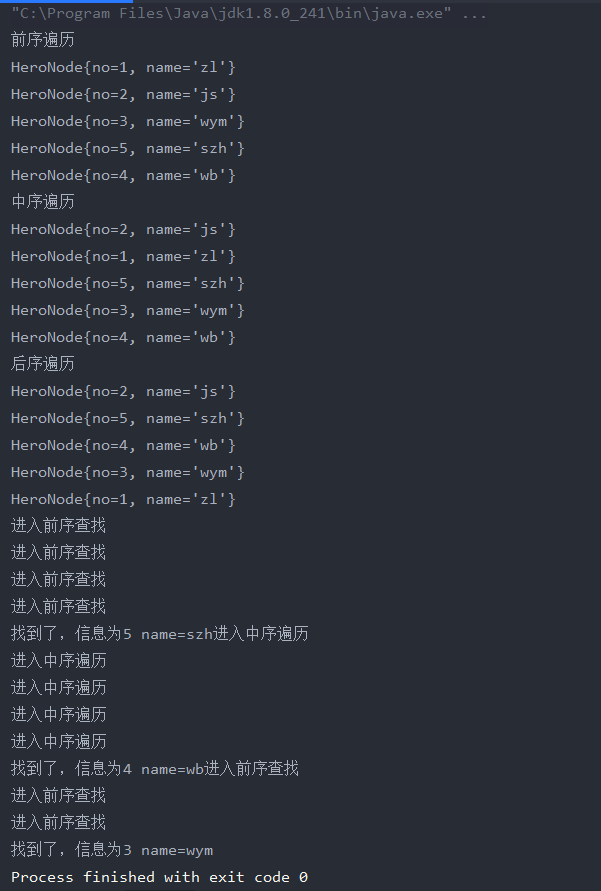
3. 删除结点
若删除的结点是叶子结点,则删除该结点
若删除的结点是非叶子结点,则删除其子树
3.1 思路分析
- 若树为空树,则只有一个root结点,等价于将二叉树置空
- 因为本二叉树是单向的,所以我们是判断当前结点的子结点是需要删除结点,而不能判断这个结点是不是需要删除的结点
- 若当前结点的左子结点不为空,且左子结点就是要删除的结点,则this.left = null,并返回(结束递归)
- 若当前结点的右子结点不为空,且右子结点就是要删除的结点,则this.right = null,并返回(结束递归)
- 若上述两步没有删除结点,那么我们就需要向左子树进行递归删除
- 若还没有删除结点,则向右子树进行递归删除
3.2 代码实现
HeroNode类增加方法
/**
* 递归删除结点,若删除的是叶子结点,则删除。若非叶子结点,则删除该子树
* @param no 编号
*/
public void delNode(int no) {
//若结点的左子结点不为空,且左结点就是要删除的结点,则将 this.left = null,且退出递归
if(this.left != null && this.left.no == no) {
this.left = null;
return;
}
//若结点的右子结点不为空,且右结点就是要删除的结点,则将 this.left = null,且退出递归
if(this.right != null && this.right.no == no) {
this.right = null;
return;
}
//向左子树进行递归删除
if(this.left != null) {
this.left.delNode(no);
}
//向右进行递归删除
if(this.right != null) {
this.right.delNode(no);
}
}
BinaryTree类增加方法
//删除结点
public void delNode(int no) {
if(root != null) {
//若只有一个root结点,这里直接判断root是不是要删除的结点
if(root.getNo() == no) {
root = null;
}else {
root.delNode(no); //递归删除
}
}else {
System.out.println("空树,不能删除");
}
}
测试
System.out.println("测试删除");
binaryTree.delNode(3);
System.out.println("测试前序遍历");
binaryTree.preOrder();
4. 二叉树的顺序存储
从数据存储来看,数组存储方式和树的存储方式可以相互转换,即数据可以转换为树,树也可以转换成数组
顺序存储二叉树的特点
- 顺序二叉树通常只考虑完全二叉树
- 第n个元素的左子结点为 2 * n + 1
- 第n个元素的右子结点为 2 * n + 2
- 第n个元素的父结点为 (n - 1) / 2
- n:表示二叉树中的第几个元素
4.1 顺序存储二叉树遍历
package cn.imut;
import java.sql.SQLOutput;
public class ArrBinaryTreeDemo {
public static void main(String[] args) {
int[] arr = {1,2,3,4,5,6,7};
//创建二叉树
ArrBinaryTree arrBinaryTree = new ArrBinaryTree(arr);
arrBinaryTree.preOrder();
}
}
class ArrBinaryTree {
private int[] arr; //存储数据结点的数组
public ArrBinaryTree(int[] arr) {
this.arr = arr;
}
//方法重载
public void preOrder() {
this.preOrder(0);
}
/**
* 前序遍历
* @param index 数组下标
*/
public void preOrder(int index) {
//若数组为空,或者arr.length = 0
if(arr == null || arr.length == 0) {
System.out.println("数组为空,无法遍历");
}
//输出当前元素
System.out.println(arr[index]);
//左递归
if((index * 2 + 1) < arr.length) {
preOrder(2 * index + 1);
}
//右递归
if((index * 2 + 2) < arr.length) {
preOrder(2 * index + 2);
}
}
}




 浙公网安备 33010602011771号
浙公网安备 33010602011771号